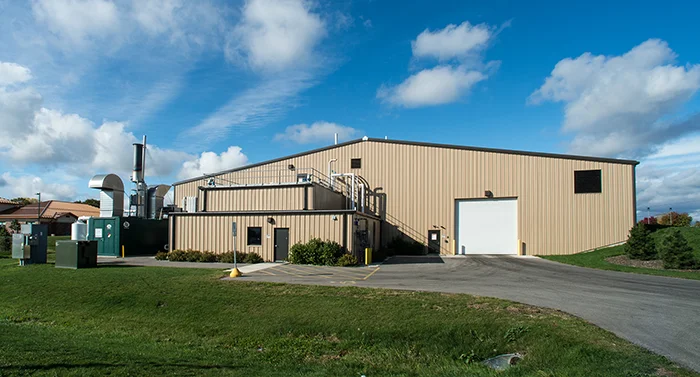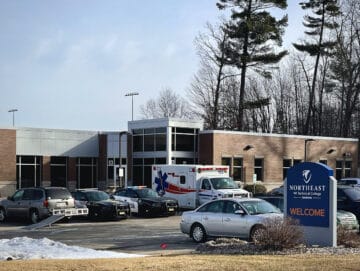
November 17, 2022
OSHKOSH – For years, many have placed an emphasis on reducing the world’s carbon footprint and becoming more sustainable.
A couple of farms in Northeast Wisconsin are partnering with the University of Wisconsin-Oshkosh (UWO) and a California-based energy company to make those things become a greater reality – and using a means you might not imagine.
The university has partnered with Agra Energy Corp. to promote a new technology that converts biogas to fuel.
Using Agra’s Micro-GTL (gas-to-liquids) technology, methane-rich biogas (manure) will be converted into diesel and aviation fuel.
Those involved officially broke ground on a commercial facility to convert dairy farm waste into renewable biofuel last month – the first-of-its-kind system in Wisconsin.
The $20 million facility, located at Dairyland Farm in New Franken, will convert biogas waste into an estimated 750,000 gallons annually.
The operation is expected to be up and running as early as January 2023.
Not UWO’s first go-around
It may be the first-of-its-kind system in the state, but it’s not the first time UWO has worked with local farmers to create renewable energy.
The university initially partnered with Allen Farms in Oshkosh to build a small-scale anaerobic digester in 2013 on the farmland.
The digester – which is owned and operated by the university – uses the farm’s agricultural waste (manure) to create energy.
Brian Langolf, director of Biogas Systems and Research Development at UWO, said it’s a win-win for the school and the farm.
“They get a better manure-management tool for their farm, instead of simply spreading it on the fields,” he said. “They get odor and pathogen reduction. They get nutrients in a more bioavailable form for plant uptake and a better fertilizer product so they can use fewer synthetic fertilizers. And they also get the heat off the system for heating their facilities.”
Langolf said because the university owns and operates the digester, it gets the benefit of the electricity it produces, making it a mutually beneficial relationship.
“We use the electricity and get paid for that electricity from the power utility,” he said. “We use it for carbon offsets on our campus, making us more sustainable.”
Langolf said anaerobic digesters can be used to process any waste stream, both human or agricultural, including food waste, yard waste and manure waste.

The University of Wisconsin-Oshkosh initially partnered with Allen Farms to build a small-scale anaerobic digester in 2013. The digester – which is owned and operated by the university – uses the farm’s agricultural waste (manure) to create energy. Submitted Photo
“Wisconsin is a huge agricultural community, so if we could leverage all these different waste streams from our state, we can actually develop home-grown energy sources,” he said. “That could lead to a lot of high-tech, high-paying jobs.”
Langolf said these are all things that could eventually benefit individuals or communities.
?“There are models that exist in other (places) and there’s a lot of research and development being done with microgrids and other things,” he said. “The technology exists, but our current power infrastructure isn’t set up that way right yet to be decentralized.”
Langolf said there are more than 7,000 dairy farms in the Badger State, and only 45 of them currently have digesters – so, he said, there’s tremendous, untapped potential.
“Our earlier project on Allen Farms was to demonstrate that small-scale anaerobic digester technology can work, which will hopefully show farms of any size they can have real energy and better manure management tools at their disposal,” Langolf said.
Taking the next step
In 2019, UWO tapped into its established partnership with Allen Farms to test Agra Energy’s technology through the installation of a small-scale Micro-GTL pilot unit, which is connected to the UWO digester.
Langolf said a portion of the biogas produced from the farm’s dairy manure is used to create synthetic fuel products.
“We partnered with Agra Energy, and in 2019, we built a pilot facility on the Allen Farms as a demonstration site and have been doing (test) runs there for the last couple years or so,” he said. “That (research and development) work led to the groundbreaking of a $20 million project at Dairyland Farms in New Franken, which is the commercialization of the micro-gas to liquid technology from Agra Energy.”
Tony Long, Agra Energy’s president and chief technology officer, said the technology has been around quite a while and is used in significant ways around the world, but this is the first time somebody’s taking it and applying it on such a small scale, and also specifically applying it to waste-stream gasses.?
“The equipment used in other places around the world requires it to be basically pure, natural gas, right out of the ground,” he said. “What we’re doing is changing the chemistry: we’re converting not only the methane, but about 25% of the Co2 in our process, and using that carbon to create liquid fuels.”
Long said the Dairyland Farms full-size commercial system will be approximately 40 feet wide by 100 feet long, with an approximate 57-feet tower, and be owned and operated by Agra.
Between that and the necessary buildings associated with the project, Long said the system will take up about a half-acre of land.
He said fuel projection will be between 1,800-2,000 gallons a day.
Long said Agra Energy chose this particular farm because the owners were open to the new technology.
“We were also trying to do this in Wisconsin and because of (past projects with the university), I already had my operations staff picked out, and I knew I could hire folks I had a lot of confidence in,” he said. “Another part of it for us was when we came to Wisconsin, we were welcomed and helped. No one has ever done this commercially, so we wanted to do this first-of-its-kind system in Wisconsin.”
Those involved said there are four main goals associated with the Dairyland Farms project.
1.) Use the waste stream versus a food stream to create renewable fuels.
2.) Create fuels that are drop-in, so they can go into existing infrastructures, engines and so forth.
3.) Create another alternative for monetizing those waste streams – not only for farmers but for anyone – by changing the kind of waste you’re using.
“There are quite a few waste streams out there, and we’d like to prove there’s another way to create a marketable product,” Long said.
4.) Offset fossil use.
“Every gallon we can make is a gallon somebody didn’t have to take out of the ground,” Long said. “I think we’d all like to have fewer gallons taken out of the ground if we can. But we need to maintain our standard of living.”
Mutually beneficial partnerships
UWO Chancellor Andrew Leavitt said the university – which is committed to reaching its own carbon neutrality by 2030 – won’t be involved in the New Franken farm long-term but has been invaluable to the project at its core, especially in the beginning.
“We contributed in two major ways,” he said. “The first is we provided a farm-sized biodigester so that Agra Energy could come in and set up a test plant or test pilot, if you will, for the process they’re using to create diesel and aviation fuel from cow manure.”
Leavitt said the university also provided technical expertise “through our faculty, and certainly, our students.”
“Agra has been great about engaging our students to be a part of the research project, as well as hiring them to be permanent employees,” he said.

In 2019, Agra Energy built a pilot facility at Allen Farms in Oshkosh as a demonstration site and has been doing test runs there for the last couple of years. Submitted Photo
Long said Agra has already hired three UWO graduates as full-time students and expects to hire a fourth sometime in the coming months – all four will work at the New Franken farm.
He said installation of the digester should be completed in January, with start-up scheduled for mid-winter.
Long said delivery of the first fuel is anticipated to be around April 1, 2023, barring any future delays.
He said supply chain issues delayed the original September delivery date, as well as increased costs by about 40%.
Long said he expects the partnership between Agra Energy, Allen Farms and UWO will continue for years to come.
“UWO has been a wonderful home and partner for us, to go from pulling together certain technologies, perfecting them and then being able to deploy them commercially,” he said. “We also have several different technologies we’re working on to bring from where they’re currently at – which is still sort of bench-top science – forward to commercialization.”
Renewable energy arena
Local energy companies are also doing their part in the renewable energy arena.
Matt Cullen, spokesman for Wisconsin Public Service, said the energy company and its sister company, WE Energies, are implementing an innovative pilot program for the use of renewable natural gas (RNG).
“Through the pilot, we are partnering with Wisconsin dairy farms to supply high-quality renewable natural gas to our distribution systems,” he said. “This project will be capable of producing enough renewable natural gas to heat thousands of homes each winter.”
Cullen said the RNG pilot program is part of WPS’s commitment to delivering affordable, reliable and clean energy to its customers.
“RNG supplied through our program will directly replace higher-emission methane from natural gas that would have entered our pipes,” he said.
Cullen said they hope to implement the program by the end of this year.
He said as many as 45 farms of any size can participate in the pilot program.
So far, Cullen said four farms have signed on to participate.
 Ushering the next generation into the healthcare pipeline
Ushering the next generation into the healthcare pipeline Business support is critical to alleviating blood shortages
Business support is critical to alleviating blood shortages






